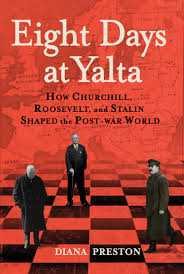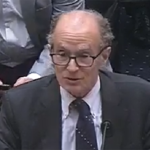On Feb. 11, 1945, President Roosevelt, British Prime Minister Winston Churchill and Soviet leader Josef Stalin signed the Yalta Agreement during World War II.
Depois de Tordesilhas, em 1493, o segundo grande acordo diplomatico que dividiu o mundo entre "grandes" potencias. Este duraria quase meio seculo. O primeiro durou poucos anos.
Paulo Roberto de Almeida
Big 3 Doom Nazism and Reich Militarism; Agree on Freed Lands and Oaks Voting; Convoke United Nations in U.S. April 25
YALTA PARLEY ENDS
Unified Blows at Reich, Policing Spheres and Reparations Shaped
FRANCE TO GET ROLE
Broader Polish, Yugoslav Regimes Guaranteed -- Curzon Line Adopted
By Lansing Warren
Special to The New York Times
RELATED HEADLINES
Big 3 Agreement Lauded by Hoover: 'Strong Foundation' for New World, He Says -- Austin Asks Bipartisan Planning
Pacific War Role for Soviet Hinted: Date of United Nations Parley Follows 'Denouncing' Time of Russo-Japanese Treaty
OTHER HEADLINES
Roosevelt Presses World Money Plan: He Asks Congress for Action on Monetary Fund and on Bank of Reconstruction
Ives Assails Foes of Anti-Race Bills as Disfavor Rises: But Demand for Immediate Vote by CIO Head is Unlikely to Head Off Opposition: Press For Public Hearing: Legislators Confident of Aid From Minorities -- Chamber Attack Called 'Degrading'
Cleve, Pruem Fall: Allies Capture Two Key Westwall Positions in North and Center: Opposition is Light: Germans Draft Women for Volkssturm -- New Clashes Reported
Manila Trap Shut; Luzon Is Crossed: U.S. Forces Unite to Squeeze Capital as Armored Push East Reaches Coast
Red Army Is at Bober River After 16-Mile Gain in Silesia WPB Takes Charge Of Match Output
Monday Meat Ban Flouted Again; Cafes Exhibit and Serve Steaks
Elliott Roosevelt Made Brigadier By Senate 53 to 11, on War Record
Washington, Feb. 12 -- Allied decisions sealing the doom of Nazi Germany and German militarism, coordinating military plans for Germany's occupation and control and maintaining order and establishing popular governments in liberated countries were signed yesterday by President Roosevelt, Marshal Stalin and Prime Minister Churchill near Yalta in the Crimea, the White House announced today.
The conference, held in the summer palace of former Czar Nicholas II on the black Sea shore, also called for a United Nations security conference in San Francisco on April 25.
The parleys, hitherto shrouded in secrecy except for a brief outline of the agenda issued Feb. 7, were held day and night from Feb. 4 until the final signatures were affixed. The announcement did not refer to President Roosevelt's future movements except that he had left the Crimea.
Main Points of Accord
Major decisions of the conference include:
(1) Plans for new blows at the heart of Germany from the east, west, north and south.
(2) Agreement for occupation by the three Allies, each of a separate zone, as Germany is invaded, and an invitation to France to take over a zone and participate as a fourth member of the Control Commission.
(3) Reparations in kind to be paid by Germany for damages, to be set by an Allied commission. The reparations commission, which will establish the type and amount of payments by Germany, will have its headquarters in Moscow. [Secretary of State Stettinius and Ambassador Harriman arrived in Moscow Monday.]
(4) Settlement of questions left undecided at the conference at Dumbarton Oaks and decision to call a United Nations conference at San Francisco April 25 to prepare the charter for a general international organization to maintain peace and security.
(5) Specific agreements to widen the scope of the present Governments in Poland and Yugoslavia and an understanding to keep order and establish Governments in liberated countries conforming to the popular will and the principles of the Atlantic Charter.
(6) A general declaration of determination to maintain Allied unity for peace.
German People Apart
The statement announced common policies for enforcing unconditional surrender and imposing Nazi Germany's doom. The document draws a distinction between the Nazi system, laws and institutions, the German General Staff and its militarism, which will be relentlessly wiped out, and the German people.
"It is not our purpose," it declared," to destroy the people of Germany, but only when nazism and militarism have been extirpated will there be hope for a decent life for Germans, and a place for them in the community of nations."
Until this conference the Allies had laid down no iron-clad program for the control and complete reorganization of Germany. Military plans will be made known only "as we execute them," said the statement, and the surrender terms "not until the final defeat has been accomplished."
Coordinated administration and control has been provided in a central Control Commission, which will be established with headquarters in Berlin. Part of its work will be to insist on the destruction of all German military equipment, elimination or control of all German industry that could be used for military production, the punishment of war criminals and the wiping out of all Nazi institutions from the German economic and cultural life.
The document mentioned no discussion of plans in the Far eastern theatre of the war or any understanding with the Soviet Union for entry into the war against Japan, but the fact that the date for the United Nations conference, April 25, comes one day after the date determining of a renewal of the Russo-Japanese agreement was remarked as significant.
That San Francisco had been chosen as the site for the next security conference of the United Nations, along with the date, aroused considerable interest here because of the city's remoteness from the European theatre of war and its position nearer the Far Eastern theatre.
New Cabinet Indicated
Special dispositions with regard to Poland include the widening of the present Provisional Government to include other democratic leaders in Poland and abroad.
The agreement sets the Polish eastern boundary, with a few alterations in favor of Poland, along the Curzon Line and recognizes that Poland must acquire substantial territory in the north and west but leaves these decisions to the peace conference. This is the first official mention to confirm the Allies' contemplation of a general peace conference.
With regard to the conflict for power in Yugoslavia the Allies have agreed that Marshal Tito and Dr. Ivan Subasitch shall set up the Government they have proposed but to include former members of the Parliament who did not collaborate with the enemy.
These Governments, it is provided, will be succeeded by those formed in conformity with desires expressed in popular elections and in the spirit of the Atlantic Charter. The statement does not deal specifically with the situation in Greece or other countries but declares that the conference also made a general review of other Balkan questions.
Fascism to Be Uprooted
In a declaration on the liberated areas, the Allies announced the intention of consulting in the interests of the liberated peoples and to cooperate in rebuilding the national economic life in these countries. Vestiges of nazism and fascism are to be destroyed, and the Allies will cooperate to establish internal peace, carry relief and form interim governments broadly representative in the Axis satellite states as well as in liberated Allied countries.
An important feature of the international security discussions was contained in the announcements that the three powers had reached agreement on the disputed question of voting procedure, which prevented completion of the work at Dumbarton Oaks. No indication of the solution was given.
The three Chiefs of State were assisted by their Foreign Ministers, chiefs of military staffs and numerous other experts, as was the case in the previous three-power meetings. Besides Secretary of State Edward R. Stettinius Jr., President Roosevelt was accompanied by Harry L. Hopkins, his special assistant, and Justice James F. Byrnes, Director of the Office of War Mobilization and Reconversion.
Other United States delegates included W. Averell Harriman, Ambassador to the Soviet Union; H. Freeman Matthews, the State Department's Director of European Affairs; Alger Hiss, Deputy Director of Special Political Affairs, and Charles E. Bohlen, assistant to the Secretary of State.
Throughout the Conference President Roosevelt occupied apartments in the former palace of the Czars. Marshal Stalin and Prime Minister Churchill were housed in separate establishments near by.
Three women were with the delegations. Though they did not participate in the discussions, they were received as conference guests. They were Mrs. Anna Boettiger, daughter of President and Mrs. Roosevelt; Mrs. Sarah Oliver, daughter of Prime Minister and Mrs. Churchill, and Kathleen Harriman, daughter of the Ambassador to Moscow.
President Roosevelt's party also included Edward J. Flynn of New York, who did not attend conference meetings but was invited as a personal friend when Mr. Roosevelt learned that he was planning a visit to Moscow.
Leahy Also in Party
Others in the President's personal party were Admiral William D. Leahy, chief of staff to the President; Mr. Byrnes, Vice Admirals Ross T. McIntyre and Wilson Brown, Maj. Gen. Edwin M. Watson and Stephen Early, the President's secretary.
President Roosevelt, whose movements have been obscured by censorship for more than three weeks, left Washington for the Crimea conference almost immediately after his inauguration ceremonies on Jan. 20. The details of the voyage were not made public, but it was revealed that the President met Prime Minister Churchill on the island of Malta, which the British and American delegations reached Feb. 2. President Roosevelt and Mr. Churchill made a prolonged exchange of views and there were formal discussions between the British and United States Military chiefs of staff.
President Roosevelt left Malta the night of Feb. 2, going by air direct to Yalta, where he was met by Foreign Commissar Vyacheslaff M. Molotoff, who extended greetings for Marshal Stalin.
The Presidential party proceeded along the Black Sea shore two miles southwest to Livadia, where stands the magnificent Summer Palace.
Meetings began the next day on the arrival of Marshal Stalin, who flew from his headquarters on the Russian front, where the Silesian Offensive was just getting under way. The delegates met either in committees or as a group. Besides daily meetings of the three heads of Governments and the Foreign Secretaries, separate meetings of the Foreign Secretaries and their advisers were held daily.
The Foreign Secretaries arranged for regular conferences every three of four months. The meetings will be held in rotation in the three capitals, the first to be called in London after the San Francisco meeting.
At the close of the conference President Roosevelt presented to Marshal Stalin a number of decorations awarded by the United States to military men in the Red Army. Those to be decorated will receive the rank of commander in the Legion of Merit. They include Marshal Alexander M. Vasilevsky, Chief of the General Staff of the Red Army; Air Chief Marshal Alexander A. Novikoff, commanding general of the Red Air Forces; Gen. A. K. Repin, Chief of the Soviet Military Mission to the United States; Lieutenant General Brendal, Lieutenant Colonel Krolenko, Major General Levanovich, Major General Slavin, Deputy Chief of the Red Army Staff, and Colonel Byaz.
The decorations were given in recognition of distinguished services in connection with their cooperation in American Air Force shuttle-bombing operations in Germany.
The first news of the historic consultation at Yalta was issued at the White House by Jonathan Daniels, administrative assistant to the President, who opened his announcement to the impatient correspondents with the statement: "This is it."
Announcement of the Allied report on the conference made in the Senate was greeted with cheers, which continued while the upper house adjourned.

 The Guardian, via Democracy Digest, February 10, 2020
The Guardian, via Democracy Digest, February 10, 2020
